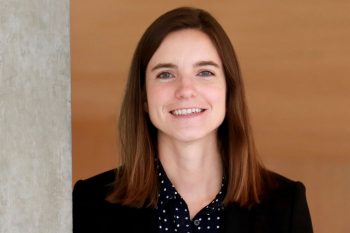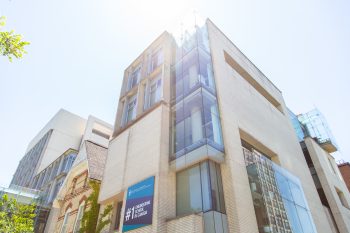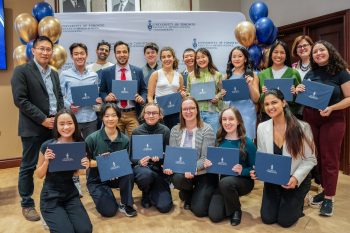June 3, 2009
Three innovative programs at the University of Toronto’s Faculty of Applied Science and Engineering have been recognized with significant funding awards, under the Collaborative Research and Training Experience (CREATE) program of the National Sciences and Engineering Research Council of Canada (NSERC).
NSERC CREATE supports innovative training programs that encourage collaborative and integrative approaches, address significant scientific challenges associated with Canada’s research priorities; and facilitate the transition of new researchers from trainees to productive employees in the Canadian workforce.
The first University of Toronto program being recognized is the NSERC CREATE Program in Microfluidic Applications and Training in Cardiovascular Health (MATCH). Michael Sefton is the Principal Investigator. The co-PIs from U of T are:Michelle Bendeck; Axel Guenther; Eugenia Kumacheva; Milica Radisic; Craig Simmons; Yu Sun; Aaron Wheeler; and Lidan You; and Mike Organ of York University.
The MATCH Program will train engineers and scientists who are skilled in microfluidics and related biomedical research. Emerging microfluidic technologies can be used to create powerful “lab-on-a-chip” systems that promise to revolutionize the discovery and development of novel therapies to treat cardiovascular disease. The MATCH Program will supply industry and academia with researchers who have the interdisciplinary knowledge and skills required to lead the development of these transformative technologies.
Craig Simmons of the MATCH Program team says, “We are most grateful to NSERC for investing in the training of engineers and scientists with expertise at the interface of technology and medical sciences. With the support of NSERC and the MATCH Founding Partners – CMC Microsystems (Kingston, ON), Corning Incorporated (Corning, NY), and Eastman Kodak Company (Rochester, NY) – our program will equip its graduates with the scientific and professional skills required to turn ideas into innovations that ultimately will solve Canada’s most important health challenges.”
The second program being recognized is the NSERC CREATE Program in Collaborative Academic Rehabilitation Engineering (CARE). Tom Chau is the Principal Investigator. The co-PIs from U of T are Milos Popovic, Geoff Fernie,Alex Mihailidis, Bryan Maki, Paul Santerre, Catriona Steele, Hani Naguib, Willy Wong, R. Baecker, and A. Colantonio.
The Collaborative Academic Rehabilitation Engineering (CARE) program will train a new breed of engineers who not only have profound disciplinary knowledge, but the cross-disciplinary breadth to effectively address 21st century rehabilitation challenges. With no other formal academic rehabilitation engineering training program in Canada, and in fact, very few in the world, the CARE initiative is strategic; it will build on existing strengths in engineering and rehabilitation sciences, to assert Canada’s preeminence in rehabilitation engineering by cultivating a new generation of engineering leaders poised to transform rehabilitation on a global scale.
“I would personally like to express my deepest gratitude to NSERC for recognizing the unique Canadian opportunity to pioneer the interprofessional formation of academic rehabilitation engineers,” said Dr. Tom Chau. “Disability is a growing fact of life. The NSERC funded CARE program will ensure that we will have the erudite scholars to tackle the many real-life challenges facing Canadians for years to come, through excellence in integrative engineering.”
The third program is the NSERC CREATE Training Program in Nanoscience and Nanotechnology. Stewart Aitchison is the Principal Investigator. The co-PIs are M. Mojahedi, G.C. Walker, D.F.V. James, H. Ruda and N. P. Kherani. This program will emphasize the integration of electronics and photonics at the nano scale. The program is designed to provide the trainees with skills suitable for both academic and industrial careers and to build capacity within the Canadian research and development communities.
Each of the awards is valued at $1.65 million over six years.
“We are grateful and proud of this recognition,” said Cristina Amon, Dean, Faculty of Applied Science and Engineering. “Being chosen for three out of the 20 NSERC CREATE awards across Canada reinforces the leading role of our Faculty, especially when it comes to creating innovative programs which combine synergistically our education and research mission.”



